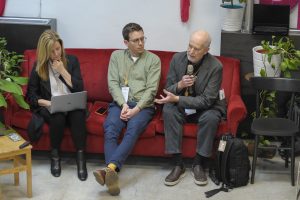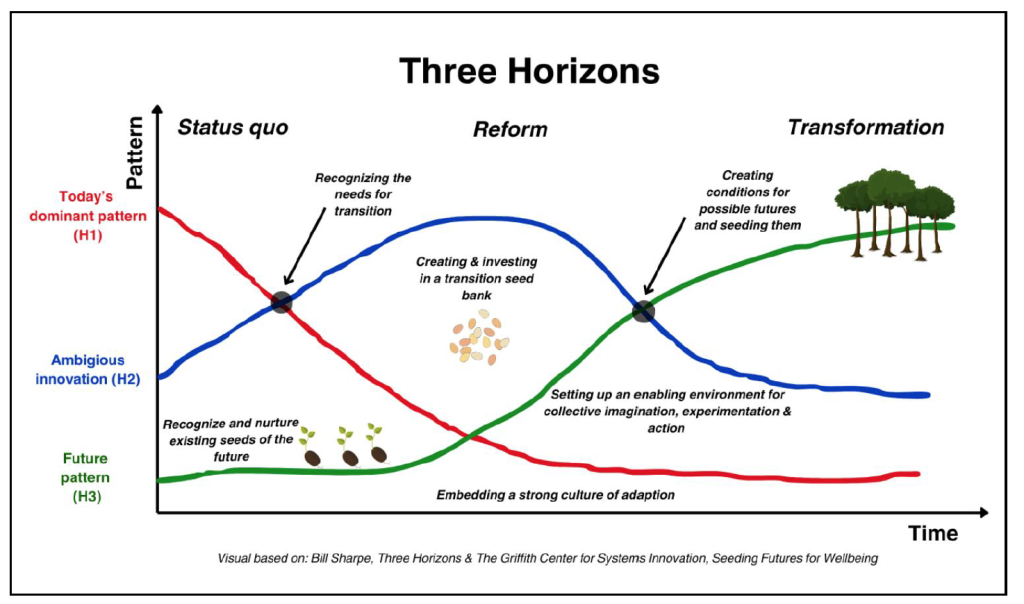At PEX Forum 2024, community members hosted intimate group conversations to uncover the uncertainties and dilemmas that sit with them and their communities, encouraging divergence and exploration. One of these discussions was led by Michelle Baldwin and Tim Draimin of Community Foundations of Canada on secondary operating systems for innovation.
The terms ‘secondary operating system’ comes from John Kotter’s dual operating systems concept, which proposes a network-like structure operating in parallel with the traditional hierarchical structure. The second system, populated by employees of all levels unshackled from silos, is designed to be agile, foster creativity and rapidly respond to to changes and opportunities.
I had the chance to speak to Michelle and Tim to delve deeper into how innovation and experimentation could impact philanthropy infrastructure.
Zibran Choudhury: Could you share more about the work of Community Foundations of Canada?
Michelle Baldwin: So our purpose statement is to relentlessly pursue a future where everyone belongs. And so when we speak to that, it’s really centring: what is the role of community foundations? We have 207 cross Canada and a movement globally and really trying to bring that future to reality. The work is very rooted in building the capacity and capabilities of community foundations for the present, and the transformation work, , what we’re really trying to do is to unlock the potential of community philanthropy.
In regards to the future mindset, it’s asking how are we shifting power which includes mobilising all the forms of capital, whether that social, financial, political narrative, cultural and technological capital.
Tim Draimin: We want to be a catalyst to help, support the pioneering edge of community philanthropy to be able, to adapt and recognize the changing context in which philanthropy has been undertaken.
In 20 first century, , we’ve left behind the simpler world that philanthropy was born in, and that the structures of philanthropy were designed for. So how, do we kind retrofit our methodologies and our thinking to be able to protect our relevance going forward.
ZC: During your fireside chat at PEXforum, you mentioned ‘getting out of your bath water’ and engaging a broader ecosystem. What made the European context appealing to you?
TD: Canada is a very large country with a very small population, in a certain sense, geographically isolated from a lot of the rest of the world, except we have the world’s largest land border, which is with the United States.
So, we get a lot of kind of information and, and I guess cultural and other kinds of influences are coming from the South to the North, and, I think that the ecosystem of the United States offers certain kinds of insights around philanthropy, but many of those aren’t the ones that are most relevant for Canada.
I’m hopeful about the reciprocity around the learning and unlearning. If we are going to have these conversations and hold this kind of hope, we need to get under the hood of what’s actually happening
When I think of Europe and what’s happening in Europe, t’s a context that we don’t get to connect with very often. There is a different relationship between the public sector and civil society than there is, let’s say, in North America. the social economy, which is very strong, is very differentiated across Europe.
Europe is about half a billion people, and I think there’s a very rich terrain to be able to learn from.
MB: What struck me and what I knew to be true, which was illustrated even more by coming to the PEXforum for is the number of philanthropic support organisations that exist in the European context compared to Canada. And so while we do have some that we can collaborate with, that opportunity to be learning, with those who are really bringing that systems transformation and future lens, is a gift, because we don’t have as much of that opportunity. This idea of the cross-sector collaboration, of bridging across nonprofits, business in government, is really core to our approach. I think it’s something that maybe could be lifted up even more in the work as we go forward. Sometimes when you fuse different thinking into the space, it can unlock something else as well.
You mentioned that the three horizons model is one of many foresight tools. What makes this one distinct?
MB: I think in trying to express what transformation means visually, it really captures the sense of radically changing from one approach to another, and it has the horizons of time structure in it. I think, for me, that’s why it’s valuable.
Often, when we’ve been doing this work within the Community Foundation movement and in philanthropy, where that first horizon of the present, and optimising it for change. People are seeing that as transformation, rather than seeing it actually.
This takes time. And it’s not just this near future, but it’s also borrowing from some of the indigenous wisdom of the seven generation, like, so you’re really getting into more of that future mindset.
TD: For me, I’ve found the Three Horizons Tool just a really effective one for helping people to think more creatively, helping them to become more reflective about the pattern of improvements to their work that they’ve been comfortable in undertaking up until now.
In most cases, and understanding, like making the shift from the incremental to the kind of reform that’s transformational, and using the insights that come from using the tool, to create more of a generative environment for being open to exploring entirely different ways of approaching how they’re they’re at solving problems, or helping them to dig deeper into their own analysis of really, what are the root causes that they want to orient themselves more too?
I hope PEXforum 2024 set the stage for this shift that we’d like to see the sector move towards and create a climate for people to recognise how experimentation and innovation has to be more integrated in what they’re doing.
Because the structure of so much of the social sector has been conditioned to be, attending to the symptoms, which hasn’t really been that stimulative of innovation. I think the Three Horizons Framework is really good for helping to provoke that kind of cultural shift with within the voluntary and philanthropic sectors.
One of the pillars of your work focuses on storytelling and narrative shifting. This is obviously of interest to AllIance! Could you share more about this work? What advice would you give to other navigating this area of work?
MB: We added the storytelling and narrative shifting into this work because we knew that in order to shift mindsets and imagine a different system of philanthropy, you have to have that inspiration of what’s worked and what hasn’t worked as a driver to how we can get there.
Within this, we wanted to bring a sense of an intergenerational approach. We have four young storytelling fellows focusing on transforming capital, climate, equity and reconciliation. I think having those voices who bring those different perspectives, on themes that are important to them is a way to infuse these new ideas of a different system of philanthropy, from other generations and other perspectives.
You mentioned it’s an emotionally difficult time in Europe, and there’s a lot of pessimism, particularly around climate change and conflict. Do you feel hopeful about the field and the future of Europe?
TD: What I find exciting is the breadth and depth of different experiences that people are undertaking and the kind of experiments that are already being undertaken, and the investment into projects that touch on the role of philanthropy, that are very supportive around civil society, and focused on building their capacity and infrastructure
There’s also an upswing of the shift from technological innovation to recognising the value of mission innovation like that has really been grown in in Europe, so I look to Europe a to provide the experimental petri dishes that a lot of us can be learning from.
MB: For me, I’m hopeful about the reciprocity around the learning and unlearning. If we are going to have these conversations and hold this kind of hope, we need to get under the hood of what’s actually happening?
I find Canada often wants to emulate what we’ve seen in Europe but sometimes we miss the moment of checking what worked and what didn’t work.
Finally, what do you want participants to take away from PEXforum 2024?
MB: It would be inspiration and imagination. I think it matters how we way we come into these conversations when thinking about what our collective accountability to innovation is, and to embrace this both inside and outside our organisations. I hope we can have more dialogue about this.
I hope for more exploration in our role in the emerging spaces. Like, how much attention is being paid to what’s happening with Artificial intelligence, Blockchain, Web 3.0. What is our role in philanthropy to shape it? And then, what is the potential disruption? And I think, whether it’s technology or other things outside of our own usual view, taking the time to think about, what are those big seismic shifts that are going to be impacting us, and having deep conversations about them.
TD: I hope PEXforum 2024 set the stage for this shift that we’d like to see the sector move towards and create a climate for people to recognise how experimentation and innovation has to be more integrated in what they’re doing.
Well, what does that mean for each organisation? It’s not going to happen, if there isn’t a plan. There’s got be resources. People have to feel that they’re freed up to be able to do it.
And then, and then how do we sustain that over longer period of time? So we’re not talking about innovation that’s going be momentary, as we’re really talking about creating a kind of generational cultural change in how our organisations are operating, because there’s a lot of adaptation over time.
Zibran Choudhury is Networks and Engagement Lead at Alliance magazine








Comments (0)